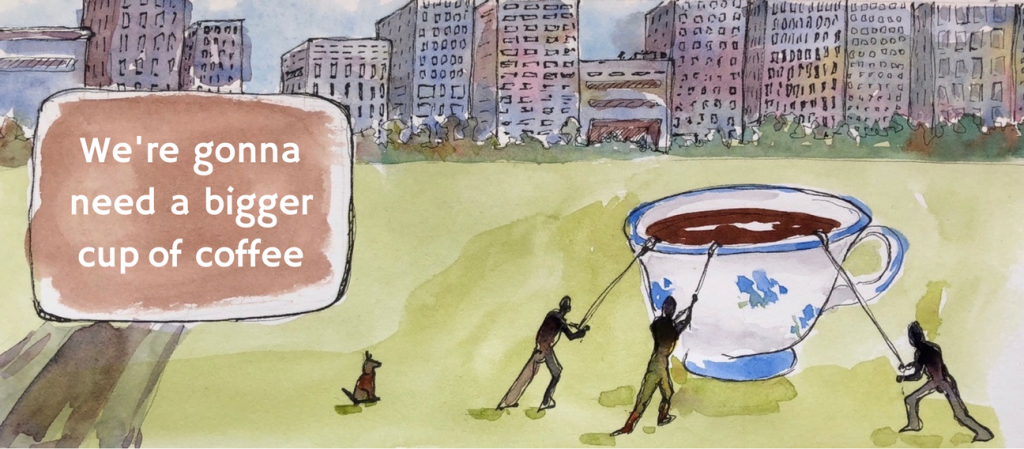Writing can’t be taught. We have to teach ourselves, word by painful word. And most people probably won’t ever get any good at it.
Very macho, very tough love, and also completely untrue.
Some writers love this point of view, which strikes me as,
Pull the ladder up, boys, I’m aboard!
Now I’m not saying that all of us can be the next “insert the name of your absolute most admired writer here.”
Because we already have a Salman Rushdie and a Luvvie Ajayi and a Jenny Lawson. You’re never going to become them, and you shouldn’t.
It’s your lifetime’s creative task to become a fantastic version of yourself.
I’ve taken a lot of writing classes and been part of many, many writing groups. And here’s what I’ve observed:
Writing can absolutely be taught, but it needs to be taught in the right environment. (Freakishly giant cup of coffee is optional.)
Without that, most writers quit or stagnate before they have the chance to get really good.
From my observation, the elements of an effective writing program are not so much a series of steps as a cycle. And for me, safety is the most important place to start — maybe because it’s the element that’s so often missing.
#1: Safety
American culture in particular has a myth that we need to suffer humiliation or pain in order to grow. It’s the kick-in-the-ass school of individual development.
I see this advice everywhere, including from “experts” who are otherwise very smart:
You need brutal feedback or you’ll never get better.
But that’s not supported by the evidence. Study after study shows that self compassion is a more useful context for learning and growth than harshness is.
I’ve seen “brutal feedback” stop writers altogether far more often than I’ve ever seen it help them grow.
Sometimes, writers, thinking that this kind of feedback is what they need to get better, will ask a reviewer to “tear their work to shreds.”
Here’s the problem with that:
You can’t (effectively) work on everything at once.
If you’re writing fiction and your grammar is bad, your characters are thin, and your plots don’t make sense, you’ll progress much faster if you work on those one at a time. The key to improvement is to take any of those and break it down to something manageable that you can practice and improve.
Which brings me to:
#2: Manageable, focused exercises
Instead of trying to “be better at everything,” find controlled, doable exercises that will help you build one strength at a time.
Then work on them most days (every day is best if you can do it), for short, focused periods. You’ll make much more progress with a daily 15-minute exercise than you will trying to crunch through exercises for two hours every Sunday.
You’re looking to find or invent exercises that can take you safely out of your comfort zone without overwhelming you. For our newbie fiction writer above, these might be:
- Install a grammar checker, and every time it flags something, look it up in a good grammar book so you can understand the rule you’re breaking
- Practice writing half-page passages where you demonstrate something surprising about a character
- Write short-short stories (no more than 2 pages long), each one trying out a different plot device
Each of these focuses on a particular area of improvement, and gives real-world practice that you don’t have to get too “precious” about. And that’s the third part of the cycle:
#3: Messy practice
You can’t get better at any creative work without practice.
But it’s really hard to make yourself practice when you feel like crap every time you create a piece.
Artists keep sketchbooks full of ugly drawings, funky color combinations, spills, smudges, and other creative fails. They do it so they can discover their own style — what they like, what they don’t like, and what they want to work on.
Writers need to do the same. We need to give ourselves spaces to practice making ugly sentences, funky paragraphs, stupid ideas, awkward phrases, and other creative fails.
A great writing voice doesn’t come from studying how to write “perfectly.”
Machines are learning to write perfectly. As creative writers, it’s our job to focus on improving what a machine can’t learn to do.
And finally, it’s really hard to make creative progress without a fourth piece to the cycle:
#4 Helpful feedback
I hesitate to even use the word critique, because there’s so much bad critique out there.
For some reason, otherwise perfectly nice people turn into sadists when asked to critique someone’s work.
Helpful feedback is different. It helps you to pinpoint areas of improvement. It also shines a light on what you’re doing well — because doing more of that is often where you start to see your own unique voice emerge.
It may not always feel wonderful, but it never feels overwhelmingly painful. It always leaves you with straightforward advice on what to work on next.
To give helpful feedback, your reviewer needs experience. They need to know how hard it is to get the words onto the page. They need to know what it’s like to wrestle with something they aren’t good at yet. And they need a healthy dose of humility — because one person’s crap is another person’s Da Vinci Code.
(Maybe you don’t much like the Da Vinci Code. That’s fine. But I’m pretty sure the author is glad he trusted his own vision for the book.)
Coming Soon: The creative writing workshop for content creators
Since I believe these are the essential elements of a good creative writing course, it only makes sense that I’m building my own workshop around them.
The goal is to help you make remarkable strides in the quality of your writing — and to give you tools and techniques that will let you continue to improve after the workshop is over.
Here are some of the foundational pieces:
- The environment will be completely safe. No “brutal feedback” is allowed — not even of ourselves.
- We’ll work through focused, interesting exercises to build different writing muscles. Each week we’ll work on exercises to improve our craft, sharpen our observational skills, and practice the different components that come together into a well-structured piece of content.
- We’ll develop a “messy practice” tool that will become your new constant companion (at least as long as you’re with the class — but I hope you keep it going forever).
- And you’ll have the opportunity to add on a detailed critique from me, where I’ll help you to see the areas you can work to improve, give you concrete suggestions on how to improve them … and show you what you’re already doing brilliantly and should do more of.
If you’re interested in joining us, drop your email in the form below and I’ll let you know when we’re ready for students! I’m really excited about this class, and I’ll be delighted to see you there.
By the way, I’m currently running two email systems (is this a good idea? No), so blog subscribers might get two versions of today’s post. I’m working on getting those consolidated so I’m not annoying you with extra messages. 🙂


Hi Sonia – I just started following you and your blog. This post struck a chord with me as I remember reading William Zinsser’s book on learning how to write. He believed writing could be learned and I’m glad to hear you confirm it in this post. I just started writing professionally, and I found that the most challenging part is to find someone to give feedback on your writing so I can continue to improve. Often other writers provide critique based on their styles, so I’m not sure how to incorporate the feedback because I want to keep my own style.
Looking forward to hearing more about your workshop. Sounds fun!